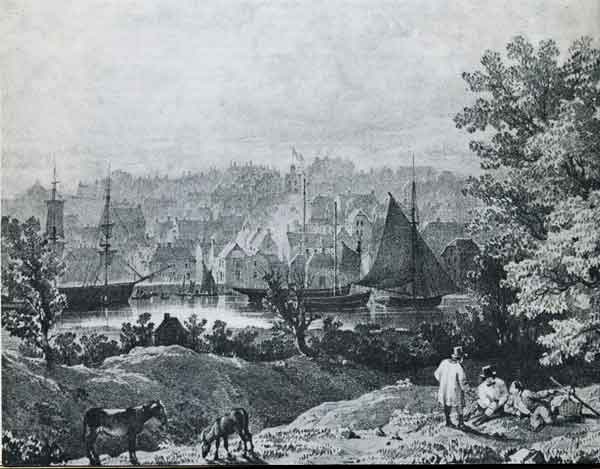
(text)
The Port

The Fishermen
The fishing industry was one of the mainstays: whiting off Newtown,
flounders in the creeks off Pennington; oysters, prawns and shrimps trawled
for or netted in the sides of the lakes and creeks;
off Yarmouth and Freshwater, the lobster trade; and, on the face of the mud
as the tide retreated, the whelks, periwinkles, cockles and mussels - ail
this abundance was harvested by fishermen needing sturdy craft.
Boat-builders became part of the Lymington scene.
The Port and its Natural Surroundings
The River thrived; by 1660 as much coal was being handled in Lymington as in
London. The coal and general trading brought ships of 1300 tons displacement
up to the Town Quay, vessels being able to work the double tides in the deep
river. Trading with the farthest corners of the world, Lymington was a
commercial port, albeit with its natural fauna and flora unspoilt. Spartina
townsendii covered the marshes from Hurst to Chichester; coot flocked along
the coast in the dead months, plover abounded. Man, his industry and the
world of nature-all depended upon the double tides and their fierce scouring
of the river bed.
High-handed vandalism: a fortunate paradox
Incredibly, in 1731 a merchant captain of Boldre, named William Cross, built
a dam across the river. It was 500 feet in length, 30 feet wide and 20 feet
deep.
By the time that the citizens of Lymington invoked the force of Law against
him, the Captain had died. His widow and a tailor named William Lyne then
exacted a toll upon all who crossed the 'dam'. At Winchester Assizes in
1739, Lymington Corporation lost the action against Widow Cross to demolish
the causeway.
The ships that carried the bricks from the Walhampton brickyard to the West
Country; the stone from Swanage for lime-making; the Salterns and the salt
exports to America, Newfoundland, Holland and the Channel Islands; the
sailing colliers and the timber ships; the oyster fisheries - all these
industries depended upon the scouring of the tides. The ire expended upon
Widow Cross was as nothing to the rage felt at the final indignity - a
tailor levying the toll.
The Port that Died
The river inevitably silted up, soundings less than seven years later
revealing an accretion of three to four feet of mud. Ships of deep draught
could no longer use the quays; so died the commercial port of Lymington.